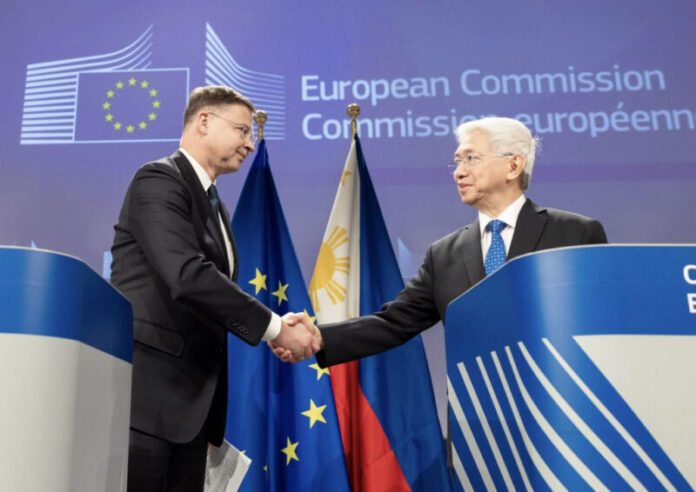
-
The Philippines and the European Union are resuming negotiations for a free trade agreement, with the first round of negotiations expected later this year
-
The Philippines aims for “an ambitious, balanced, and comprehensive FTA with the EU”
-
The Department of Trade and Industry said the PH-EU FTA aims to provide enhanced market access for goods, services and investments, going beyond the benefits of the GSP+
The Philippines and the European Union (EU) are resuming negotiations for a free trade agreement (FTA), with the first round of negotiations expected to take place later this year.
The announcement marks deeper economic ties and unlocks mutual benefits for the Philippines and the EU, the Department of Trade and Industry (DTI) said in a statement.
“Strengthening economic engagement with the EU remains a priority for the Philippines,” Trade Secretary Alfredo Pascual said, adding that the EU is one of the country’s largest trading partners and sources of investment.
European Commission Executive Vice President and Trade Commissioner Valdis Dombrovskis said: “The conditions are right to take our trade relations to the next level. Trade between the EU and the Philippines is already strong and has been growing at an impressive pace over the past decade.”
In a separate statement, the EU said an FTA with the Philippines, which it noted is “a booming economy of 115 million people in the heart of the strategically important Indo- Pacific region, would therefore be a valuable addition to the EU’s network of trade deals.”
The EU said it aims for a comprehensive FTA with the Philippines that includes ambitious market access for goods, services, investment and government procurement; the removal of obstacles to digital trade and trade in energy and raw materials, thereby supporting the digital and green transitions; swift and effective sanitary and phyto-sanitary (SPS) procedures; sustainable food systems (SFS); the protection of intellectual property rights including Geographical Indications (GIs) and robust and enforceable disciplines on trade and sustainable development (TSD) – in line with the European Commission’s TSD review Communication of June 2022, supporting high levels of protection for workers’ rights, the environment, and the achievement of ambitious climate goals.
The Philippines, meanwhile, aims for “an ambitious, balanced, and comprehensive FTA with the EU.”
“Our approach is guided by the Philippine Development Plan 2023-2028, directing us to advance purposive, assertive, and forward-looking FTAs,” Pascual added.
The EU and the Philippines first launched negotiations for an FTA in 2015. The last negotiating round took place in 2017 and negotiations have since been on hold. On June 30, 2022, the current administration assumed office and has shown willingness to engage with the EU on key issues of importance. In 2023, the EU and the Philippines launched a stocktaking exercise to assess their readiness to resume negotiations for an FTA, which was concluded at the end of 2023, confirming that a resumption of negotiations would be appropriate.
In 2023, the EU emerged as the country’s 5th largest trading partner with total trade amounting to $16.16 billion (8.1% share to PH total trade), the 6th export market with $8.37 billion, and the 6th import supplier valued at $7.79 billion. Similarly, the EU has been a major foreign investment partner, with total foreign direct investments reaching $29.16 million in 2022 and $63.99 billion in 2023.
Over the past decade, the Philippines’ trade engagement with the EU has primarily occurred within the EU Generalized System of Preferences Plus (GSP+) offering zero tariffs on more than six thousand tariff lines or 66% of all EU tariff lines. The GSP+ has significantly benefitted numerous communities, including General Santos, Davao, Cebu, and economic zones situated in cities such as Laguna, Cavite, and Batangas.
Moreover, it catalyzed foreign investment, particularly in electronics, agriculture, processed foods, apparel, craft goods, travel goods, and home appliances.
“As we look ahead, the Philippines is committed to deepening economic ties and fostering cooperation with the EU across emerging trade areas like critical raw materials, climate change, environmental sustainability, labor, and good governance,” Pascual said.




